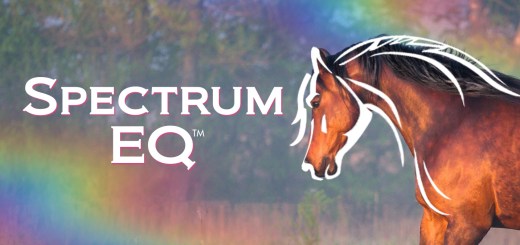
Thera Calm EQ: The Equine Stress Formula
As many people know, I am rather obsessed with the GI tract. The more I learn, the more compelling I find the functions of the GI tract and their interconnectedness: gut to brain to immune system to glandular systems. It only made sense to apply those connections to the problem of equine stress.
The horse’s body is an amazing network of biological organization. It can respond to acute stress in an instant: the brain’s fight-or-flight mechanism tells the body to send blood to the limbs, the adrenal gland responds with more cortisol, the brain triggers norepinephrine, and the GI tract responds with and increase in gut permeability, less blood flow to the GI tract and increased gastric acid production.
In the case of acute stress, the horse fights or runs away from the perceived danger. Once the danger has passed, cortisol production is reduced, the brain stimulates the calming neurotransmitter serotonin, and the GI tract goes back to digesting food.
The body under chronic stress
Remember the days when we had records, and the needle of the record player would get stuck in a groove? That is what essentially happens when a horse is under chronic stress: the body gets trapped in the cycle of the brain telling the gut there is danger.
Chronic equine stress causes constant high-level production of cortisol from the adrenal glands, increases inflammation in the GI tract, increases gastric acid production, decreases nutrient absorption, and disrupts the immune system, desensitizing it to cortisol and further heightening the inflammatory response. Chronic stress leads to changes in brain function, including reduced ability to learn or remember, reduced control of impulsive behavior, and lower levels of critical neurotransmitters like serotonin and dopamine that play important roles in mood, learning, concentration, appetite, and sleep.
In addition, chronic stress…
…is the root cause of ulcers; even low levels of chronic stress can fuel the merry-go-round of ulcer treatment, recovery, relapse, and then treatment again.
…increases reactivity in the horse, impairing the ability to relax, focus and concentrate.
…changes gene activity of immune cells before they enter the bloodstream, readying them to fight infection or trauma even when there is no infection or trauma to fight. This leads to increased inflammation. The pro-inflammatory substances called cytokines are associated with a host of chronic inflammatory and autoimmune conditions.
…increases cortisol production, leading to a suppression of lymphocytes (white blood cells), which play a critical role in killing invading organisms and toxins. Sustained increases in cortisol can lead to metabolic imbalances, and potentially laminitic episodes.
Conventional approaches to equine stress
One of the most widely used medications in the horse world is omeprazole, a proton pump inhibitor and the standard treatment for gastric ulcers. For hindgut ulcers, sucralfate and/or misoprostol are often prescribed. Then we have the calming supplements, providing everything from mega-doses of magnesium, thiamine, inositol, and tryptophan, to herbal formulas with valerian and chamomile.
This combination of medications and calming supplements works very well for a lot of horses, but doesn’t address the third prong of the brain-gut axis: the adrenal glands and the cortisol they produce. With our understanding of the communication between the brain, the gut, and the adrenal glands, a stress supplement needs to address all three of these major biological systems. If we feed conventional supplements for calming we are not addressing cortisol and the GI tract. If we use traditional ulcer medications we are not addressing critical neurotransmitters or the adrenal glands.
The BioStar approach to equine stress
 BioStar’s Thera Calm EQ provides:
BioStar’s Thera Calm EQ provides:
- specific foods for increased serotonin production in the brain
- GI tract support for prostaglandin regulation
- gastric and intestinal mucosal protection
- adrenal support to balance the production of cortisol.
First tested in the high-stress atmosphere of the Winter Equestrian Festival in Wellington, Florida, Thera Calm EQ demonstrated both short-term and long-term benefits to horses under stress, including increased focus, lower anxiety, elimination of hypersensitivity to grooming and tacking up, a calmer more relaxed attitude, and an improvement in body condition in the horses that are easy keepers.
Personal experience with Thera Calm EQ
My beloved horse Lionheart has always been a kind of cool customer: not the kind of horse that is overtly affectionate, not the kind of horse that likes to be hugged or fussed over, and please leave his ears alone. He prefers the company of horses to the company of humans. He was also a poster boy for chronic gastric ulcers when he was a performance horse.
In his retirement, however, Lionheart’s life is bucolic: the lovely pastures of Virginia, his white pony girlfriend at his side, his whole food diet, a small herd of horses to live with…what could be less stressful? Still, as an experiment, I started Lionheart on Thera Calm EQ. I had no expectations, because he is not a horse under stress. But much to my surprise, five days after starting on Thera Calm he put his head in my arms and didn’t make his usual grumpy ugly face when I put the fly mask over his ears. Sure wish I’d had Thera Calm when he was training and competing!
Read more about the gut-brain connection and equine stress.










Hi Tigger,
You are so right on in your thinking. Thanks for your diligent work. Horses will thank you